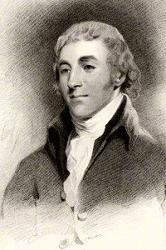1797 - 1851 Person Name: J. W. Meinhold Hymnal Number: a805 Author of "Gentle Shepherd, Thou hast stilled" in In Excelsis Meinhold, Johann Wilhelm, D.D, son of Georg Wilhelm Meinhold, pastor at Netzelkow on the island of Usedom, was born at Netzelkow, Feb. 27, 1797, and entered the University of Greifswald in 1813. He became rector of the Town School at Usedom in 1820. In 1821 he was appointed pastor of Coserow in Usedom, and, in 1828, of Crummin in Usedom (D.D. from Erlangen in 1840). He finally became, at Easter, 1844, pastor at Behwinkel, near Stargard. He was a staunch Conservative, and after passing through the revolutionary period of 1848, this feeling, coupled with his leaning to Konian Catholicism, made him resign his living in the autumn of 1850. He retired to Charlottenburg, a suburb of Berlin, and died there, Nov. 30, 1851 (Allgemeine Deutsche Biographie xxi. 235; MS. from Pastor Schmock of Netzelkow, &c).
Meinhold is perhaps best known by his historical romance Maria Schweidler, die Bernsteinhexe (1843), which professed to be taken from an old manuscript and was universally accepted as genuine. His poems appeared in his Gedichte, Leipzig. 1823; Vermehrte Gedichte, Coserow, 1824; Proben Geistlicher Lieder, Stralsund, 1834; Gedichte, Leipzig, 1835, &c.; and also in Knapp's Christoterpe and Evangelischer Lieder-Schatz
Meinhold's hymns are of considerable interest. Those translated into English are:—
i. Guter Hirt, du hast gestillt. Death of a Child. This beautiful little hymn is in his Gedichte, Leipzig, 1835, vol. i., p. 38, in 3 st. of 6 1., and headed, "Sung in four parts beside the body of my little fifteen months' old son Joannes Ladislaus." (In reply to inquiries addressed to Crummin in January, 1888, Provinzial-Vikar Bahr has kindly informed me that this child was born at Crummin April 16, 1832, died there, of teething, on July 2, and was buried there, July 5, 1833.) It is included in Knapp's Evangelischer Lieder-Schatz, 1837, No. 3411 (1865, No. 2983). Translated as :—
Gentle Shepherd, Thou hast still'd. A full and very good translation by Miss Winkworth, in her Lyra Gemanica, 2nd Ser., 1858, p. 122. This has passed, unaltered, into many recent hymnals, as the People's Hymnal, 1867, Hymnary, 1872, Hymnal Companion, 1876, &c.; and in America, into the Presbyterian Hymnal, 1874, Evangelical Hymnal, N. Y., 1880, and others. In the Appendix of 1868 to Hymns Ancient & Modern, it was included as No. 358, with long in st. i., 1. 2, altered to brief, and beginning, "Tender Shepherd, Thou hast stilled." This form has been followed in the Society for Promoting Chrisian Knowledge Church Hymns, 1871, Baptist Hymnal, 1879, &c.; and in America, in the Episcopal Hymnal, 1871, Hymns & Songs of Praise, N.Y., 1874, Laudes Domini, N. Y., 1884, and many others.
ii. 0 Bethlehem! 0 Bethlehem! Was ist in dir geschehen. Christmas. This fine hymn is in the Appendix to Knapp's Evangelischer Lieder-Schatz, 1837, p. 837, and in Knapp's Christoterpe, 1838, p. 152, in 7 st. of 7 1. Translated as "0 Bethlehem! 0 Bethlehem!" by Dr. H. Mills, 1845 (1856, p. 272). [Rev. James Mearns, M.A.]
-- John Julian, Dictionary of Hymnology (1907)
Johann W. Meinhold


 My Starred Hymns
My Starred Hymns




